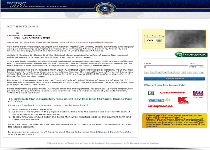Sus/20121889-A
Along with Exp/20121889-A, Sus/20121889-A is a vulnerability that's used to attack your PC from a remote web page. Sus/20121889-A is specially-crafted to attack Internet Explorer and most versions of Windows, and loading a Sus/20121889-A-infected website isn't guaranteed to display obvious symptoms of an attack. Because Sus/20121889-A doesn't have an official security patch for its exploit, SpywareRemove.com malware researchers strongly encourage you to be cautious while web-browsing and use...
